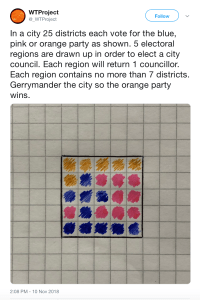Today, I’m reflecting on vision and mathematics. That’s largely because as I write this, I’m also simultaneously evaluating whether a new computer I received as an early Christmas present is going to be a good fit for me or if I’ll need to return it in favor of one that I find more accessible given a specific set of eye muscle problems I have. Those eye muscle problems cause images to double, switch back and forth, or even twist in a way that can best be described as appearing to be melted.
Even as a kid, I thought “wandering eyes” and “lazy eye” were pretty mild descriptors for what I was experiencing: wonky eyes that mostly seemed to operate out of their own accord and without consulting one another. For instance, sometimes I just couldn’t keep one eye from turning in towards my nose. So, for a good chunk of the day, I would be trying to learn or play while also getting constant and disruptive views of my nose. Without being able to do anything to change the images I was receiving. Talk about distracting and frustrating. Often, glasses on or glasses off, I couldn’t see very well.
Somehow – I’m still not 100% certain how – I thrived academically, though I was never given the option of receiving academic accommodations for my vision issues until I reached college. Even then, my vision issues greatly impacted my education and the quality of life I experienced while I was in school. I had to work incredibly hard to master concepts that I knew wouldn’t be so challenging if I wasn’t visually impaired. I graduated, triumphant but burned out from having to push myself so hard to excel despite my visual disability, and uncertain that I wanted to attend graduate school, despite my deep love of math.
Things are better now. After I was told at age 24 that my only option for ameliorating my double-vision was for me to wear an eye patch at all times for the rest of my life, I got fed up and pursued a direction that is still controversial in the medical community: vision therapy. Specifically, mine is a combination of exercises and a virtual reality program in which I play games designed to help my eyes work together more effectively. Two years into therapy, things are better now, but I still have a long way to go on my journey to better vision.
Reflecting on all of this, I don’t think we talk enough about mathematics and vision, or about how vision problems can affect mathematical education. As a student, when I was struggling because of vision issues, sometimes I felt lost about how to begin discussions with professors about the medical challenges I was facing and I often wasn’t aware of the options that might have been available to help me in different ways.
Below is a short list of pieces related to the topic of mathematics and vision problems. Continue reading











